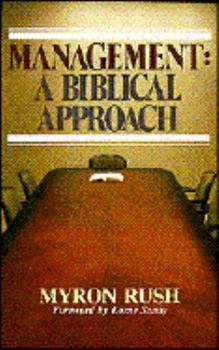Management: A Biblical Approach
Select Format
Select Condition 
Book Overview
In this updated classic, Myron Rush gives excellent counsel-biblically principled and biblically practical-to those who have been called of God to lead and manage others. This description may be from another edition of this product.
Format:Paperback
Language:English
ISBN:0882076078
ISBN13:9780882076072
Release Date:January 1983
Publisher:Chariot Victor Publishing
Length:236 Pages
Weight:0.75 lbs.
Dimensions:0.6" x 5.1" x 7.7"
Customer Reviews
2 ratings
A Classic!
Published by Thriftbooks.com User , 15 years ago
The classic standard in a management book from a Christian perspective. Plenty of scripture given for each principle he writes about.
Needed A Biblical Approach
Published by Thriftbooks.com User , 23 years ago
Without a doubt, a biblical approach to church management is needed. In the recent past, ministries have instead adopted secular management principles, which view authority simply as manipulation. The very premise of secular management is getting work done through other people. Conversely, Rush understands Christian leadership to be focused on serving those in the ranks, not lording authority over them. Christian management, by definition, is meeting the needs of people as they labor at accomplishing their jobs. In return the people eagerly work hard for their servant-leaders. Rush's writing is based on the Tower of Babel account in Genesis 11:1-9. From this text he derives four keys for a successful organization: it must have (1) commitment to a common goal, (2) unity among the people, (3) effective communication, and (4) a desire to do the will of God. The author notes that the last of these keys was not found in the construction of the tower, and so the plan was confounded. "And the Lord said, Behold, the people is one, and they have all one language; and this they begin to do: and now nothing will be restrained from them, which they have imagined to do" (v.6). From my perspective, the book addresses three main issues in relationship to the above keys: people, plans, and problems. People, Rush suggests, are our greatest resource. They can improve project performance immensely if managers will simply recognize their creative abilities. How does that happen? The author recommends that leaders (1) build trust relationships, (2) delegate decision making power, (3) turn mistakes and failures into learning experiences, and (4) provide gratitude to those who make a difference. In addition, it is vital that the people are rallied with a team spirit toward a common goal. Teams, the author states, improve quantity and quality of production. Why? Team members are allowed to compensate for the weaknesses and compliment the strengths of the others on the team. Rush also sees God with a specific plan for the ministry (or business) and as the source of all power to accomplish that plan. He states that in order to know God's will, one must first be committed to doing it. Plans then are formulated around this vision and in the power of God.Finally, the book deals with solving problems. The author notes the importance of handling difficult situations quickly and wisely, as "conditions degenerate as needed action is delayed." Particularly problematic areas include communication, delegation, and time management. Leaders must be aware of the power of their verbal and nonverbal communication. Rush states that 55% of communication is in fact nonverbal, 38% is in the tone of voice, and only 7% is actually in the words we use. In order then to be effective, leaders must not only work on what they say, but how they say it. This is especially true during times of conflict, when weaknesses and faults are magnified. Christians should deal onl






